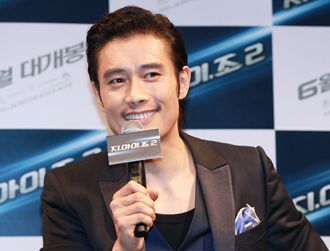Lee Byung-Hun Sees GI Joe As Hollywood Stepping Stone
By wchung | 27 Jul, 2025
The difference in scale between stardom in S. Korea and Hollywood stardom is best exemplified by the kinds of roles that quality actors like Lee Byung-hun take on in hopes of getting a break in Hollywood.
Lee is one of S. Korea’s top stars, having enjoyed success as a model and a singer as well as the star of internationally acclaimed and successful films like Joint Security Area (2000), A Bittersweet Life (2005), The Good the Bad, the Weird (2008) and I Saw the Devil (2010).
In the G.I. Joe movies Lee plays Storm Shadow, the ninja bodyguard of terrorist leader Cobra Commander. The franchise is based on a plastic toy soldier introduced by Hasbro in 1964. In the first G.I. Joe movie, The Rise of Cobra (2009), Lee has all the dimensions of a plastic toy with movable body parts. In the sequel, G.I. Joe: Retaliation set for release in late June, his character is fleshed out a bit, struggling with conflicting loyalties to both Cobra and G.I. Joe.
Even the privilege of appearing with big Hollywood stars like Bruce Willis and Channing Tatum, doesn’t do much to elevate the role. In fact, Lee admits that he at first thought his character “quite silly”, though he adds that after reading up on the back story he was charmed by Storm Shadow’s “lonely, melancholy fighter aspect”.
“To be honest, I didn’t decide to play this role in the ‘G.I. Joe’ series because I felt the role was 100% to my taste, but rather because I was chosen for the role,” Lee admitted to JoongAng Daily. “I think roles like these are something I have to go through to introduce myself in this market. I want to portray this character in a multilayered way so that later on I can be in the position to choose the roles I want to play.”
Even so the demands of big-budget Hollywood movies were such that Lee admitted to coming nervous to each day of filming. Unlike Korean production in which directors could cut an actor slack from time to time, the cost side of a Hollywood film didn’t allow any such latitude. There were also the language demands.
“Whenever I got feedback from the staff on set about my Korean accent while speaking English, my mind went blank and I forgot all my lines,” he recalls. “In those moments, it felt as though I was a newcomer to this scene all over again.”
Lee was recently chosen along with fellow Korean Ahn Sung-ki, to be the first actors from Asia to leave their hand prints at Grauman’s Chinese Theater on Hollywood Boulevard.
“[Lee] showed some action moves that I could never do. I want to make another movie with him if I ever get the chance,” said co-star Bruce Willis.
Other Korean stars have recently made forays into big-budget Hollywood movies. Heartthrob Jang Dong-gun starred in The Warrior’s Way (2010), a box office and critical flop. The pop singing star Rain in Speed Racer (2008) and Ninja Assassin (2009), neither of which made much of a box office ripple.

Lee Byung-hun is a popular Korean actor and singer who plays a ninja bodyguard in the 2nd G.I. Joe installment.
Asian American Success Stories
- The 130 Most Inspiring Asian Americans of All Time
- 12 Most Brilliant Asian Americans
- Greatest Asian American War Heroes
- Asian American Digital Pioneers
- New Asian American Imagemakers
- Asian American Innovators
- The 20 Most Inspiring Asian Sports Stars
- 5 Most Daring Asian Americans
- Surprising Superstars
- TV’s Hottest Asians
- 100 Greatest Asian American Entrepreneurs
- Asian American Wonder Women
- Greatest Asian American Rags-to-Riches Stories
- Notable Asian American Professionals

